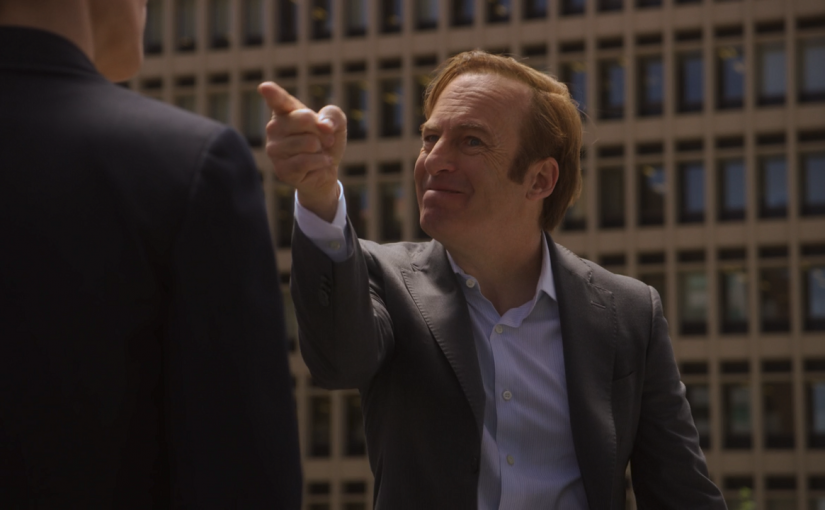When this episode began and I saw Gennifer Hutchison as the credited writer and Vince Gilligan as director, I knew “Wiedersehen” was going to be good. And it was. But it was also an episode that I don’t think I can fully evaluate until I know where some things go. It’s like Jimmy speaking to his ex-client’s next of kin about her Hummel figurines in “Piñata.” We can read as much as we like into it, but it might be worth waiting to see what happens next.
There is at least one thing, though, that we need to get clear at this exact point, before we move any further.
In a heated conversation toward the end of the episode, Kim (completely in the right) lets Jimmy have it. Whenever he needs her, she drops everything for him. She bails his ass out left and right. Whatever mess he makes, she’s the first to pick up a broom and start cleaning it up.
But Jimmy doesn’t appreciate that. At least, not as much as or in the way that he should.
So Kim tells him something. She says, “Maybe next time you call, I won’t come.”
That should sound familiar. That needs to sound familiar. Because that’s exactly the position Jimmy occupied in relation to Chuck. And in season three’s “Sunk Costs,” Jimmy told Chuck the same thing. One day he’d need him…and Jimmy wouldn’t be there.
That day came at the end of season three. And Jimmy was not there.
In his relationship with Kim, Jimmy has taken on the Chuck role. He is now the needy McGill, turning again and again to the same person to keep him functional. Taking more advantage every time. Not appreciating what he has.
And, ultimately, driving that person away.
Is that how this ends? I don’t know. But “Wiedersehen” draws the parallel almost verbatim.
It matters whether or not Kim genuinely does leave Jimmy at his lowest point, when he needs her most. Of course it does. But it also matters that this relationship echoes that one right now.
That’s terrifying.
Elsewhere, another relationship sours as well. Mike and Werner were already on tenuous ground last week, and this week things seem both better and worse. Better because the work is progressing again and Werner and Mike are back to sharing details of their lives. Worse because Werner is breaking and doesn’t let Mike know just how bad it’s getting.
And then Werner is gone. Mike spots some dead pixels on the bank of surveillance monitors and quickly uncovers Werner’s great escape.
Mike’s ultimate (in a literal sense) tragedy is that he’s a softie. I mean, he’s Mike, yes, and his badassery isn’t a front. That is really who he is. But, at heart, he also wants to see the best in people. He knows better, but keeps letting his guard down. That’s why in Breaking Bad he’s able to give Walt a speech about never taking half-measures before later taking a half-measure with the man who would kill him in return.
And it’s why here he still treats Werner as a friend, still grants him extra telephone privileges, still reassures him and does him favors, just for Werner to stab him in the back.
Mike’s tragedy is that he still has a heart. It’s that in spite of how much time he spends with, around, and against scum, he still wants to believe in people. It’s that no matter how much he hardens himself against the world, he’s still willing to let someone in.
One definite development “Wiedersehen” gives us, though, is the start of what’s sure to be a satisfying face-off between Eduardo and Gus. I mentioned a few weeks ago that Gus seems to already be at his terminal point; he’s not much different here, if at all, from the character we met in Breaking Bad. So what, really, can Better Call Saul do with him?
Well, it can give him a new adversary specific to this show, and that’s what it’s done with Eduardo.
As I said last week, Eduardo is dangerous because he’s charming, he’s fun, he’s conversational. And, sure enough, as he thanked Gus for saving Hector’s life, I was willing to believe him. I knew better, and the opening scene between Eduardo and Hector all but spelled it out for us, but…Eduardo just seems so nice. He’s insincere, as Jimmy’s reinstatement committee might complain, but…well…maybe he really is willing to reach out in peace.
He’s not. Of course he’s not. But Eduardo leaves room for a maybe, whereas Tuco or Hector or any other Salamanca absolutely does not. Eduardo has people skills. He’s all smiles and compliments and flattery. Whatever eventual confrontation happens between him and Gus, we know Gus comes out of it alive. But we don’t know precisely what that confrontation looks like, and it’s impressive that Better Call Saul has found room to keep us guessing in what I thought was a tale fully told.
“Wiedersehen” mainly just moves us closer to the end of the season. It’s doing some busywork. That’s probably why they assigned this episode to one of their best writers and clearly their best director. It was an episode born of necessity, and they found the right people to elevate it. Or, perhaps, to string it up.
We’ll see what happens next week, when they finally swing the bat.
